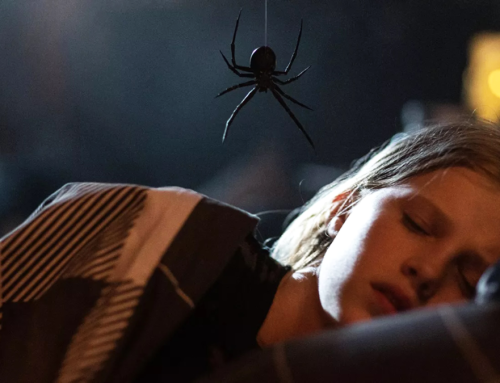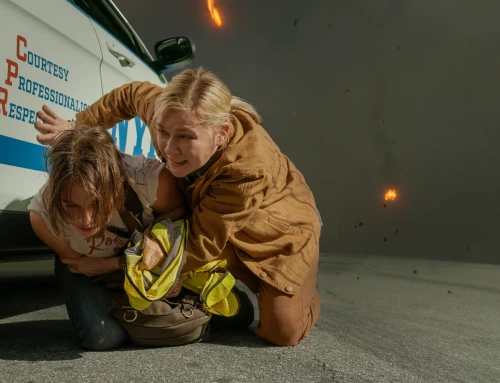Unique in narrative structure, poetic in tone, evocative of American history, and substantial as a retelling of America’s capitalistic nature and quest for prosperity, Kelly Reichardt’s “First Cow” is nothing short of memorable.
Alongside with Reichardt’s “Meek’s Cutoff,” which is a Western as well, or rather a period piece that took place during the Oregon Trail, “First Cow” is Reichardt’s second period film, one that continues her idiosyncratic and visionary spirit about America’s roots and conquest of greed and exploitation, as well as a resonant deconstruction of the rampant individualism and greedy nature that still persists in American culture today. The complex link between theft and capitalism, and how even the pioneering of America’s west holds traces of the individualistic and capitalistic nature. Reichardt has said in interviews she considers “First Cow” more as a caper than a revisionist Western.
On another level, it’s hard to think of a director in recent times who still refuses to work with larger budgets and in a small-scale filmmaking arena than Oregon native Kelly Reichardt, who’s previously helmed the rather extraordinary and well-crafted “Certain Women,” which was about the life of 4 Oregon women living their lives of suppression and repression from a male driven society. The film was a highlight of her career, while “First Cow” doesn’t quite reach that caliber, Reichardt has crafted a eloquent and minimalist caper style Western that will stay with you, and proves that Reichardt is still one of the brightest and most mature filmmakers working today.
What’s amazing about Reichart’s film, which she also co-wrote with frequent co-writer Jonathan Raymond, is that it’s not overly preachy at all, not by standards of most films that point out our current economic injustices and how America got here. Instead, she has crafted a wise, ambiguous new angle on the mythic origins of our current system, which today we see the corporatism system that pulls the strings on politicians to convince many Americans that re-opening the economy during a global pandemic is the smart thing to do as the United States now leads the world with infections and deaths from COVID-19.
Reichardt follows her central characters and their acquaintances as they try to find gold. Though it opens in modern day (with a brief, but artful opening interlude featuring Alia Shawkat), the remainder of the film takes place in the Oregon Territory in the 1820s. The film is an adaptation of Raymond’s first novel titled “The Half-Lite, the film chronicles the unexpected friendship between two men, Otis “Cookie” Figowitz (John Magaro) and King-Lu (Orion Lee). They encounter each other after sudden circumstances, in which “Cookie” cooks for a group of fur-trappers as he encounters King-Lu, who’s hiding naked deep in the Oregon forests. Cookie decides to help the man, who is on the go from some Russians. Cookie ends up guiding King-Lu safely away from the territory, but the two re-encounter each other again later in the film in a frontier town. They end up bonding and becoming close friends, and even living together. The friendship fosters, and the film draws a lot of similarities to Reichardt’s second feature, “Old Joy” (which also explored a friendship between two men.) Yet, the ideas of the natural world being overran by man’s primitive nature of power and greed are on full display here.
The film’s unique and memorable title is in reference to a dairy cow in the film that is certainly used as a metaphor throughout the film. The cow is owned by British private land owner (Toby Jones), and Cookie and King-Lu begin stealing the milk so they can bake their food. They both start cooking their own fried oily cakes, and they sell them to the local frontiersman and pioneers in hopes they can make it out to San Francisco so they can find some gold. Chief Factor takes an instant gratification to their fried cakes. The film’s tension lies in the fear in how both live in fear of being caught for stealing the milk. The irony to this is how Chief Factor is also stealing and pressuring Native American’s into bartering their own land. It’s Reichardt’s allegory on our current system, how the term “private property” is nothing more than a propertarian ideology, how it is an arbitrary drawn line in how a majority of land was indeed taken either by deadly force or by passive-aggressive persuasion, in the end it’s all forms of aggression that many hypocritical advocates on “private property” fail to realize in their oxymoron “non-aggression principle” on how the origins of property rights are indeed rooted in aggression and theft.
Reichart explores this hypocrisy in just how Chief Factor is a hypocrite, as he gets irritable about his cow’s milk being stolen so Cookie and King-Lu can cook so they can make a sweet product that pleases the community. The film becomes a sophisticated parable and portrait about the divide between democracy and despotism. This speaks to Reichardt’s boldness in her ideas and themes, as well as her in tuned attention to detail and character. Even if Reichardt declines that her films are political, the beauty of her films is how she plants these seeds for interpretation.
Such scenes and moments define Reichardt’s fully realized vision that consists of many complexities where many things aren’t so black and white, right or wrong etc. Reichardt’s films might be political parables, but she never gets lost in didacticism, instead she covers all her bases with a humanist perspective. Reichardt captures this in how Chief Factor views King-Lu, a Chinese immigrant in which Chief Factor isn’t too receptive or welcoming to, but he considers Cookie more as a friend and business partner.
The aesthetics in the film are also brilliant and visually pleasing, shot on 35mm film stock by Christopher Blavel who’s been the lenser on all of Reichardt’s films since “Meek’s Cutoff,” and each of her films since it was shot in the 1.37:1 ratio; in Reichardt’s films the film square always expresses her ongoing themes of how the characters are enduring some sort of exclusion. The ravishing forests of Oregon bring out the color scheme of green, which showcases the color of greed, and if anything the film reminded me of the sensibilities of Robert Altman, who also made cautionary and elegiac tone poems on America’s past with such period meditations like “McCabe and Mrs. Miller” and “Thieves Like Us.”
The film opens with a proverb from William Blake–“The bird is a nest, the spider a web, man friendship”–which showcases how the natural environments change from mans behaviors and decisions. It is a pleasure to report that Reichardt’s vision continues to be persistent, she has never made one bad or even disappointing film. While always deliberately paced in the most positive sense of that term, “First Cow” is certainly a highlight so far of 2020.














It looks stunning. I will have to see this one.
Like!! Thank you for publishing this awesome article.
I like the valuable information you provide in your articles.
I really like and appreciate your blog post.
Good one! Interesting article over here. It’s pretty worth enough for me.
Your site is very helpful. Many thanks for sharing!
I am very glad that I came across this article. This helped me figure it out.
Sadly this film was just too dry for my taste, I just can’t get into her work. I tried Old Joy, Wendy and Lucy, Meek’s Cutoff and now this. I think I am done giving her a chance now.
Hi, this weekend is good in favor of me, for the reason that this point in time i am reading this impressive informative piece of writing here at my home.
adreamoftrains best website hosting
I think this is one of the most significant information for me. And i am glad reading your article. But wanna remark on few general things, The site style is perfect, the articles is really nice : D. Good job, cheers|
Excellent way of describing, and nice
article
to take facts on the topic of my presentation focus, which
i am going to convey in college.
I want to watch the game of thrones in 2 days with shortening summary review. check it out
To the defactofilmreviews.com admin, Thanks for the well-structured and well-presented post!
Hi defactofilmreviews.com owner, Your posts are always well-referenced and credible.
Dear defactofilmreviews.com webmaster, You always provide useful information.
To the defactofilmreviews.com owner, Your posts are always well-timed and relevant.
Dear defactofilmreviews.com webmaster, Your posts are always well organized and easy to understand.
Dear defactofilmreviews.com admin, You always provide helpful diagrams and illustrations.
Hello defactofilmreviews.com administrator, Your posts are always well-received by the community.
Hello defactofilmreviews.com admin, Your posts are always well-formatted and easy to read.
Hello defactofilmreviews.com webmaster, Your posts are always well-supported by facts and figures.
Hi defactofilmreviews.com webmaster, Keep up the great work!
Hello defactofilmreviews.com owner, Your posts are always well-formatted and easy to read.
To the defactofilmreviews.com administrator, Your posts are always on point.
Dear defactofilmreviews.com administrator, Your posts are always well-balanced and objective.
Hello defactofilmreviews.com owner, Your posts are always well-referenced and credible.
Hello defactofilmreviews.com admin, Thanks for the educational content!
I enjoy the thought-provoking discussions that arise from your blog posts.
Thank you for the effort you put into creating valuable and engaging content.
To the defactofilmreviews.com webmaster, Thanks for the great post!
Hi defactofilmreviews.com administrator, You always provide clear explanations and step-by-step instructions.
I am captivated by the enigmatic allure that permeates your erudite prose, invoking a cerebral awakening within the minds of your readers, who find solace in the esoteric depths of your incandescent blog.
I really enjoy the article post.Thanks Again. Really Cool.
Dear defactofilmreviews.com admin, Good job!
Really informative blog post. Awesome.
Thank you for curating such enriching content for your readers.